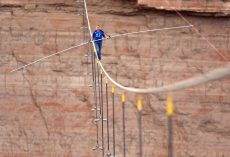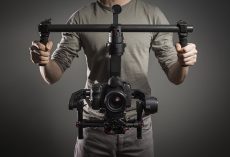Make the Most of Your 10 Minutes
Open mics are a great way for performers to share their songs, build chops, try out new material, network and have fun! For a first-timer, the thought of getting up to play and sing in front of a room full of people can be more than a little intimidating. While every open mic is a little bit different, depending on the host, the venue, the sound system and even the time of day, there are some aspects of open mic performing that apply no matter what, and this lens looks to address the factors that will help your open mic experience be a success!
Be Prepared
Before You Go
So you’ve got a handful of songs you’ve been working on at home and they sound pretty good to your mom but you want to find out how they’ll go over from a stage? An open mic night is the perfect place to try your material on a live audience.
First things first, do your research! Look up when and where your local open mics are happening and find out as much as possible about how they work. You may even want to just go watch the first time to get familiar with the space and how the evening is run. If you haven’t been there before and can’t tell if the info on the venue website is current, you may want to call and confirm that open mic is still happening and the time is the same. Busy cafes and restaurants don’t always have time to update their website info on a regular basis. (On the busy note, be sure not to call and ask questions during peak meal hours if you don’t want to have a rushed or cranky conversation!)
Depending on the space and how many people are signed up to play, you may end up performing between 1 to 4 songs, though 2 or 3 seems to be the most common. Some open mics encourage original songwriting and frown on cover songs, some are for original songs only and some don’t care what you play. Some open mics have you play your songs in a row and some are round-robin style where each person goes around the circle playing one song at a time. Also some open mics will include poetry and stand-up comedy, or will be predominantly for poetry or comedy but allow musicians to play as well. Some venues have a full PA system with monitors and others are completely unplugged acoustic. These are all good things to know ahead of time if possible so you can be prepared.
Open Mic Do’s and Don’ts
The Difference Between Being a Dud and a Delight
DO: Bring the gear you need to perform well – tuner, cables, picks, capo, etc
DON’T: Assume the venue or the host will have things like a music stand or a second microphone or guitar cable if you’re performing with someone else.
Yes, with a lot of other musicians performing in the same space, chances are high that you can end up borrowing anything from a guitar to a pick, but if there is something you absolutely need to play your songs, bring it with you!
DO: Come early to sign up and stick around to hear the other performers.
DON’T: Show up late, play your slot and leave.
We all have life, schedules, transportation issues and other things to deal with. There will be nights where you get there late or have to leave early for whatever reason. But while you are in the room, do your best to be respectful and listen to the other performers. People notice whether you pay attention or not. Even if a particular performer is not your cup of tea, you can probably still relate to what it took for them to get up on the stage, and honor them with 10 minutes of your time for their bravery and commitment to sharing their craft. Plus, if you leave early you are missing out on the opportunity to network with other musicians and potential new fans! You never know when you are going to meet your next band member, co-writer, producer or friend. Bring some simple business cards to trade and a small notebook to take down websites, email or other contact info of new folks you’d like to learn more about and stay connected with.
DO: Introduce yourself to the host and let them know you are there to perform.
DON’T: Hold the host up with lots of questions and conversation, especially at the start of the night.
Hosting an open mic can be quite the challenge, from setting up the room and the PA, to juggling dozens of performers with different needs and levels of experience, to constant adjusting of the sound system, and overall handling the flow of the evening. A brief, friendly introduction to let the host know you are there is appropriate, especially if it is your first time performing at that particular open mic, as well as letting them know if you have anything out of the ordinary in terms of your set up. General chit-chat is best saved for the end of the night when they have less on their mind, and even then, be mindful that they may be needing to pack up and get home.
DO: Make sure your instrument is in tune before you get on stage.
DON’T: Tune in the middle of someone else’s song.
If you tune your instrument before leaving the house, chances are it will be pretty close when you get to the venue and just need a little tweaking. It’s not uncommon to step out of the room or go to the back a song or two before your turn to check your tuning and center yourself before going on stage. (A word of caution, if you leave the room to someplace that is a different temperature, that can throw your tuning out of whack and you’ll just have to re-tune when you come back!)
DO: Be ready to go when it’s your turn.
DON’T: Start getting ready only after your name is called, or walk out of the room and miss your slot.
Have your instrument out, tuned, and if appropriate, discretely and respectfully work your way toward the stage when it’s almost your turn. The time between performers is the most boring for the audience, and they’ll notice if you are taking a long time before you start singing. The more you are able to minimize the transition, the more the audience and the host will appreciate your professionalism.
DO: Let the host know if you prefer to sit or stand.
DON’T: Adjust the mics and cables yourself unless they give you the go-ahead.
The host wants to accommodate you to perform in the way you feel most comfortable, so let them know your preference. It’s usually best to position yourself the way you normally would and then let them adjust the equipment to you. Not only do they know their equipment best, it may be delicate or expensive and you don’t want to be the one to ruin it!
Remember to breathe!
If you’ve got a case of butterflies in your stomach, it may help to remember that everyone performing is either as nervous as you, MORE nervous than you, or can remember the time when they were as nervous as you. So breathe, smile and do your best!
DO: Check in with the host or sound person before plugging in or unplugging your instrument.
DON’T: Unplug immediately after playing, or walk off stage with the cord still plugged in.
It’s natural to be nervous at first and until you get more used to performing, often times you’ll want to get off stage as soon as possible after you sing. But you’ll probably be even more embarrassed if you make a loud screeching noise through the sound system by unplugging your guitar too early, or if you trip off the stage because the chord is still attached! So when you are done with your songs, take a deep breath, smile and then look to the person running sound to get the go-ahead to unplug.
DO: Thank the host and the sound person (if there is someone other than the host running the sound), the venue and the staff.
DON’T: Complain or give them a hard time.
The venue, staff and host are providing a great service to you of a space to play and treating them with respect is just the right thing to do. Along with that, consider that each interaction you have with them is potentially an audition for if you ever want to play a full show at that venue in the future. Having a good relationship with the decision makers can give you a competitive advantage down the road. It’s definitely good form to make a purchase, even if it’s a small one, and be sure to tip your server. You never know when they may end up running the open mic down the road or managing the booking!
DO: Have fun!
DON’T: Take yourself too seriously.
While it may be a really big deal for you to get up on stage in front of other people and bare your soul by sharing your personal songs, it’s good perspective to keep in mind that it’s only about 10 minutes of your life, and all the other performers there are in the same situation. There will always be someone better than you and someone worse than you out in the world, so stop letting that worry you and just go for it! Someone with years of experience has been in your shoes before and can remember their first open mic, and there may be someone in the audience who has never played a song out before and is admiring and jealous of you for getting up there. The most important thing to do is have fun and enjoy!










